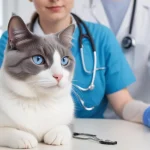Heart disease in cats is a significant health concern that can affect felines of all ages, though it is more commonly observed in older cats. This condition involves abnormalities in the heart’s structure or function, which can lead to complications like heart failure or sudden health crises. Recognizing the signs and seeking timely veterinary care are crucial for managing this condition effectively.
Types of Feline Heart Disease
- Hypertrophic Cardiomyopathy (HCM): The most prevalent form, HCM involves thickening of the heart muscles, impairing the heart’s ability to pump blood efficiently.
- Congenital Heart Defects: Rare and present from birth, these include issues like heart valve malformations or holes in the heart.
- Dilated Cardiomyopathy (DCM): Characterized by an enlarged, weakened heart, often linked to dietary deficiencies (e.g., taurine deficiency), though this is now less common due to improved cat food formulations.
- Restrictive Cardiomyopathy: Scarring or stiffness of the heart muscle restricts normal function.
Signs and Symptoms
Cats are adept at masking illness, but key indicators of heart disease include:
- Lethargy or reduced activity
- Difficulty breathing or rapid breaths
- Sudden hind-leg paralysis (due to blood clots)
- Loss of appetite or weight loss
- Fainting or collapse
Many cats show no symptoms until the disease is advanced, underscoring the importance of regular veterinary visits.
Causes and Risk Factors
While the exact cause of many heart diseases remains unknown, contributing factors include:
- Genetics: Breeds like Maine Coons and Ragdolls are predisposed to HCM.
- Age: Older cats are at higher risk.
- Diet: Historically, low taurine levels were linked to DCM.
- Systemic conditions: Hyperthyroidism or high blood pressure can strain the heart.
Diagnosis
Veterinarians use a combination of methods:
- Physical exams (listening for murmurs or irregular rhythms).
- Imaging: X-rays and echocardiograms assess heart size and function.
- Electrocardiogram (ECG): Monitors electrical activity.
- Blood tests: Rule out other conditions like thyroid disease.
Treatment Options
While heart disease is often incurable, management focuses on improving quality of life:
- Medications: Diuretics reduce fluid buildup; beta-blockers or ACE inhibitors improve heart function.
- Dietary adjustments: Low-sodium diets or taurine supplements (if deficient).
- Monitoring: Regular check-ups to track progression.
- Emergency care: Required for crises like blood clots or severe fluid retention.
Prevention and Prognosis
Early detection through routine vet visits is vital. While some forms (e.g., congenital) can’t be prevented, maintaining a balanced diet, managing weight, and controlling underlying conditions (e.g., hypertension) can reduce risks. For additional insights on maintaining your cat’s overall health, explore resources from the American Veterinary Medical Association (AVMA). Prognosis varies: some cats live years with managed care, while others face more severe outcomes.
Related Resources
CAT GROOMING NEAR ME: WHAT TO EXPECT AND HOW TO CHOOSE THE BEST SERVICE
Regular grooming is essential for your cat’s well-being. Learn how to find a trusted groomer and prepare your feline for stress-free sessions in our detailed guide: CAT GROOMING NEAR ME: WHAT TO EXPECT AND HOW TO CHOOSE THE BEST SERVICE.
Final Thoughts
Heart disease in cats is a complex but manageable condition. Owners should stay vigilant for subtle behavioral changes and prioritize regular health screenings. Partnering with a veterinarian ensures the best possible care, helping your feline companion lead a comfortable, active life despite their diagnosis.







